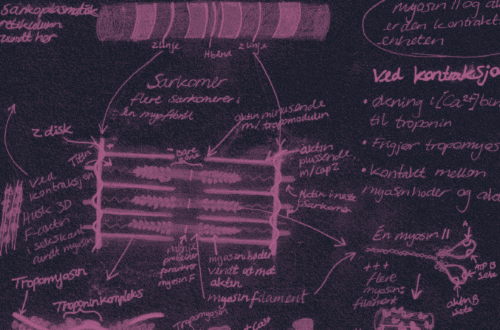Text by Samantha de Verteuil Illustration by Mette M Kaljas
In their seminal work, ‘The Myth of Enlightenment,’ Adorno and Horkheimer establish the human drive for knowledge as a primal fear of the uncontrollable forces of nature. Fear of nature manifests in a desire to explain the material world. This fear is innate in man and was labeled Mana in the earliest stages of humanity.
In early history, Mana required submission to nature, as expressed in humans mimicking the natural world. Adorno and Horkheimer give the example of the hunt, where ‘the savage nomad’ clothed himself as his prey to ‘stalk it.’ This epoch of human development was before established mythology, and its beliefs are labeled ‘Magic.’ Magic operates on specifics; man has yet to understand the abstract. The hunter stalking his prey partakes in rituals that he believes will help him hunt a specific animal. These magical rites were didactic, allowing early humans to explain the material world around them. Under magical reason, «what happens to the enemy’s spear, hair, or name, also happens to the individual.» Despite this particularity, the ritual process signifies the beginnings of abstraction, the «non-specificity of the example.» Substitution marks the shift from magic to mythology. The hunter begins to use rituals for nonspecific prey. The hide of the reindeer can be worn to hunt a rabbit and have the same magical function. Nonspecific representation becomes central in the formation of gods. «Zeus represents the sky and the weather, Apollo controls the sun…” Substitution allowed the world to become subject to man. Animism projected the human onto nature; the sun was no longer represented by fire but rather by a humanoid deity. The gods were embodiments of Mana, human representations of the unknown. Increasing abstraction shifted the power dynamics in man’s favor; the hunter no longer needed to ‘become other’; instead, ‘other became man.’ Abstraction is the tool of Enlightenment; it allows humans to generalize and conceptualize the world around them. Utilizing abstraction, nature no longer exerts its power directly but through the medium of human consciousness. Adorno and Horkheimer argue that the shift from specificity to abstraction marked the start of Enlightenment thinking. Mythology begins to encompass explanations about seasons, nature, and the material world. Reason begins to become instrumental, a function of human progression. If mythology allows men to understand the seasons, they can become better farmers; they can use the knowledge from myth to counter the powers of nature. This domination of nature, argues Adorno and Horkheimer, is central to Enlightenment logic.
As mythological explanations expanded, men utilized thought to distance themselves from nature. By increasing the separation between subject and object, humans begin to view the world through the classifiers they developed to understand it. The pre-Socratics tried to rationalize mythic logic by abstract classification. They increased the universal comprehension present in myth to include the concept of ‘all.’ All matter was made of water, or fire, or air. The pre-Socratic rational push against myth marks the beginnings of science. From the concept of ‘all’ and the increased separation of subject and object, Plato structures the framework for mathematical logic. Plato’s ideal forms, the concept that there is an ‘ideal’ tree and all trees in nature reflect this abstract pure form, showcases the dominant narrative of science. «The multiplicity of forms» reduces to equivalence, and the material world becomes a mere positioning and arrangement of the abstract. Adorno and Horkheimer connect Plato’s thought to that of Leibniz, Bacon, and De Maistre, claiming that abstraction «provided the Enlightenment thinkers with the schema of the calculability of the world.» Calculability became the standard of Enlightenment reason.
Enlightenment thinking is founded upon the idea that everything can be fully explained. Mathematical logic is the epitome of Enlightenment thinking, the idea that humans can reduce everything to numerical values. Enlightenment thought claims to reject mythological subjectivity, but Adorno and Horkheimer counter that this way of thinking is reflected in Enlightenment. Mathematical logic anthropomorphizes the world by reducing it to the faculties of our understanding. The empirical systems of the Enlightenment are human creations, and therefore, these systems categorize the world from a human perspective, just as myth had.
In both the mythical and Enlightenment mindsets, we have, as humans, a fear of the unknown, and we seek to master this unknown. Enlightenment reduces thought and recognizes it only insofar as thinking can dominate what is around it, pacifying our fears of the unknown. The progression of logic has only been to increase the domination over nature and other men. Myths’ roots in the fear of nature are the same as the roots of science; both myth and Enlightenment utilize explanation to dominate the outside world. Enlightenment and myth’s human perspective and shared fear led Adorno and Horkheimer to argue that Enlightenment thought is a form of myth.
However, the form of domination in Enlightenment differs from myth, because Enlightenment logic is totalitarian. Abstraction leads to the calculable world as developed from Plato. In rationality’s attempt to expunge myth from logic, abstract logic replaces experiential explanation. Enlightenment logic rejects any subjective reality that its mathematical logic cannot subsume; scientific logic’s rejection of mythology results in the dismissal of lived experience. The fear of nature results in Enlightenment logic rejecting anything ‘outside.’ The outside consists of any experience that the categories and classifications of the prevailing system cannot explain. Thinking becomes mechanical, the development of a closed system, and man’s act of cognition is only validated if it furthers domination.
As civilization progressed, the “transformation of the world into industry” with the rise of capitalism furthered Enlightenment’s instrumental view of thought. Capitalism and bureaucracy increase productivity by advancing scientific logic; the calculable world is one of profit and margins. Within the progression of Enlightenment, the «domination of abstraction» paired with hierarchical structures of bureaucratic capitalism resulted in persistent and inescapable domination over nature and man. From the fear of being dominated by nature, man has become dominated by himself. Man becomes reduced to an instrument of calculation, mimicking the structure he is under, as he once mimicked nature. By rejecting subjectivity and validating the abstract, Enlightenment logic rationally urges people to conform and give up their own autonomous identity. Humans no longer mimic the reindeer to survive nature but rather mimic the machine to adapt to bureaucratic capitalism.
Adorno and Horkheimer suggest that myth is Enlightenment and Enlightenment is myth by rejecting the notion of progressive human development. Historically, the human species has distanced itself from nature through Enlightenment but has failed to free itself from its mimetic origins. Adorno and Horkheimer suggest that the instrumental framing of thought, which they label positivism, results in the herd mentality responsible for the rise of fascism. Not only does Enlightenment limit thought and reason, but its totalitarian domination, calculability, and order logically lead to fascism. The fascist ideology, which seeks to eradicate ‘the other,’ ‘the outside,’ and prides itself on efficiency and social hierarchy, is not the return of barbarism, but rather the expression of Enlightenment logic. Nazism, to Adorno and Horkheimer, reflects the inevitability of totalitarian thought: domination of man, conformity, and the erasure of ‘the outside.’ Adorno and Horkheimer’s rejection of progressive human development not only results in the shared characteristics of Enlightenment and myth but also establishes a restriction in human capacity. Domination, either by nature or through bureaucratic capitalism, is the inescapable state of man. The fear of being dominated by nature has resulted in civilization producing a system of totalitarian thought and the domination of man. In the evolution of humanity, the need to conquer in order to alleviate the fear of nature has not and will not dissipate. For Adorno and Horkheimer, this is the boundary of human action and potential. To dominate and be dominated.
With the increasing fetishization of artificial intelligence as a tool to streamline, categorize, and calculate coinciding with the global rise of populist and extremist views, the era of Enlightenment has produced a form of automated domination. It is no coincidence that the ethics of artificial intelligence systems have been at the forefront of the debate on Israeli airstrikes. The modern warfare systems offering a calculability of civilian casualties functionally converts human subjective experiences and connections into input and output numbers. The very language of this technological advancement results in a mental framing which is inherently dehumanizing and mechanical. As artificial intelligence systems expand, the necessity of categories and reductionism hold greater weight. The separation of ingroups and outgroups becomes acceptable through the facade of ‘logic’s neutrality.’
Further Reading: The Dialectic of Enlightenment by Adorno and Horkheimer






